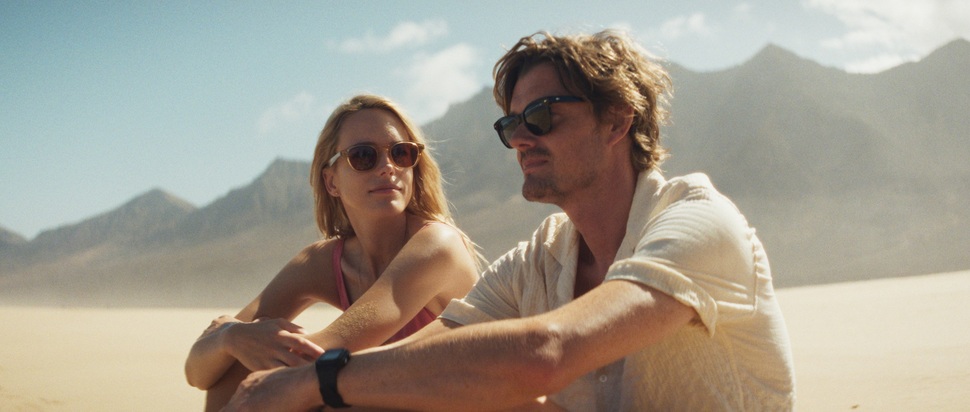Sam Riley on Islands
Sam Riley gives one of his finest performances in Islands as a washed-up tennis player who gets embroiled in a mystery. Riley tells us why he related to the character and what, to him, makes for great acting
“I was so spoiled with my first film,” says actor Sam Riley, looking back on Anton Corbijn’s Control (2007), which saw him playing Joy Division frontman Ian Curtis. “I didn’t really know what I was doing. It was Samantha Morton – my first on-screen wife – and Alexandra [Maria Lara, now Riley’s real-life spouse], two incredibly experienced actors, who really taught me how to act. Because they made everything feel real, you know? It’s like in tennis: if you play against someone good, you play better.”
Having moved to Berlin shortly thereafter, Riley’s last time in Edinburgh was almost 18 years ago for that film’s press run. Now he’s back to talk about Islands, a sun-drenched Highsmithian drama in which he plays Tom, an English tennis coach living on the island of Fuerteventura. In his mid-40s, Tom’s days mostly consist of waking up wherever he passed out the night before, and then half-heartedly feeding balls to casual players staying at the hotel until he can get drunk at the local club, go home with a stranger, and do it all again the next day.
Tom’s monotonous routine is interrupted, however, by the arrival of a holidaying English family. After spending the evening with Anne (Stacey Martin) and Dave (Jack Farthing), who insist their son, Anton (Dylan Torrell), receive tennis lessons, Tom suddenly finds himself embroiled in a missing persons case. Helping to piece the evening back together, he takes on a level of responsibility he hasn’t faced for years.
The seeds of the character were sown when the film’s writer-director Jan-Øle Gerster was himself on holiday in Fuerteventura, relates Riley. “From his room, he saw this tennis coach playing every day. He saw a guy with this dream life; he was free, no responsibilities, no children, no wife. But the longer the week went on, he realised this guy just did the same thing; he could hear the same hitting of a thousand balls a day. He was trapped and somehow lost, and life was just going by.” Riley, who was just 26 when Control came out and now finds himself closer to Tom’s age, could relate. While happily married and a father, career-wise, he had faced a few quiet periods, which had occasionally stirred up similar feelings of stagnation. “There is that [question] in your mid-40s: have you really done everything? Missed opportunities, paths not taken. I think we can all relate to that,” he says.
Despite really wanting the role, upon first meeting with Gerster, Riley played it cool. Avoiding talking about the film, they chatted coyly about the news of the day: Will Smith had just slapped Chris Rock at the Oscars (where he won for playing, weirdly, a tennis coach). On the second, he made his interest clear, and on the third, they played tennis.
Gerster needed to know Riley could convincingly deliver the film’s emotional climax. The scene sees Tom make a drunken bet with a stranger and be pulled into a tennis match where his unreturnable serve gives us a window into his faded glory and unrealised potential. Having never played, Riley – working with a tennis coach – piled pressure on himself to nail it. The resulting scene is a reminder of what a powerhouse physical performer Riley is. Islands rests on the actor’s ability to sell that Tom was once an “ace” player, just as Control had rested on Riley’s ghostly embodiment of the wildly idiosyncratic Ian Curtis.
As Tom pummels tennis balls into the ground, there are echoes of Tom Ripley bludgeoning Dicky Greenleaf to death at sea in The Talented Mr Ripley, his release of pent-up anguish giving way to a sort of rebirth. But the bloodless scene encapsulates how, though ostensibly a crime film borrowing and playing with Noir conventions, Islands’ violence is internal. While the suspense is born out of the initial disappearance, it is mostly sustained by Riley and Martin’s forlorn faces as we watch their characters work through the realisations that the event has catalysed. In that respect, Islands resists the melodrama that can often befall the mystery genre. “It’s a risk to have [such] anticlimaxes,” says Riley, “but there’s so much ambiguity in life. As an actor and cinemagoer, I’ve always been drawn to films that [reflect that]. That’s the beauty of cinema: faces, and the unsaid. When you're on set, you realise you can say stuff without saying it."
Silent close-ups, of which Islands has many, are great for actors to play because – like tennis – they demand that you inhabit the character; they require the sort of dedication that envelopes you, makes you forget about what’s come before or what’s coming next. Aptly channeling the sporting adage that his wayward coach comes to apply to life, Riley observes, “the person you’re really playing against is yourself. You’ve always got to be thinking about the point you’re playing in the moment, not the one before. To fully achieve that is impossible, I think. Which is why it’s addictive.”
Islands is released 12 Sep by BFI; certificate 15
